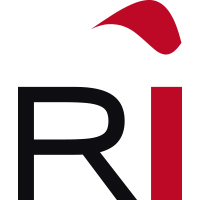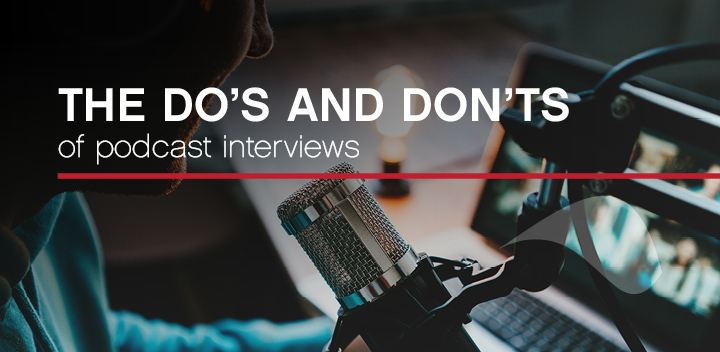Do’s and don’ts of podcast interviews
I love a good podcast. The ones that make me feel like the host and guest are standing in the same room are instant favorites — doesn’t matter what genre it is.
Personal entertainment aside, they’re also a fantastic business opportunity for B2B companies. Not only does running a podcast enable you to build brand awareness while creating content for your business and your guest’s, it’s also a great way to build relationships and have meaningful conversations with industry leaders and potential prospects.
But how do you do good podcasting?
I didn’t think this question would be so hard to answer when I first started producing our agency’s podcast, “Spill the Ink.” After all, I’m an avid consumer of plenty of great podcasts and have a background in production and storytelling as a former TV journalist. Why wouldn’t it be easy? While a lot of my skills were transferable, I had to come to terms with the fact that podcasts are unique pieces of content that require their own skillset.
In my opinion, one of the most important skills you can develop is learning how to conduct an interview. I won’t lie and say that this isn’t going to take a lot of trial and error. But I can at least help get you started on the basics.
1. Do use the right equipment — don’t neglect your audio settings
If you want podcasting to be a regular thing, then invest in a good microphone. If you aren’t ready to fully commit yet, then wear headphones equipped with a microphone — and no, not your AirPods.
Bluetooth technology is an impressive advancement for day-to-day use, but it can interfere with your audio quality since your headphones have to work harder to transmit the frequency. Using headphones — or better yet, an external microphone — that connect directly to your computer will mitigate the risk of audio issues and yield superior audio quality overall. Headphones will also help prevent the internal microphone from capturing the other person speaking and vice versa.
More likely than not, you’ll be conducting virtual interviews with your guests. There are myriad platforms you can use to record your interview remotely (we use Zoom), but you should pay special attention to your settings and research best practices for setting up high-quality audio recordings on your preferred platform.
In today’s day and age, technology is strongly embedded into our daily lives, and we’re accustomed to hearing all kinds of audio quality. This has made audiences more understanding when certain production value factors underperform. For example, I, a Gen Z, can identify Zoom audio like nobody’s business. I can quickly tell when a person’s voice clips because of a poor internet connection and will acknowledge the technical difficulties and move on. But would I prefer to have clean, crisp audio to listen to? Absolutely.
2. Do research your guest — don’t show up empty-handed
You wouldn’t show up to a meeting unprepared, so why would you interview a person without knowing anything about them or their company? Research your guest and their background, then develop a list of key questions to ask during the interview. This can help you stay on subject and enable you to quickly pivot if the conversation lulls. There’s a delicate balance to strike here, however. The best interviews flow like organic conversations, and that requires active listening. Don’t get too caught up in asking every question on your list or in the order you intended. Instead, lean on that list as needed but prioritize being present in the conversation you’re having.
3. Do make your guest feel comfortable — don’t skip the small talk
Chances are your guest will be someone you’ve never met before. Chat them up before the cameras are officially rolling. It’ll take some of the stress off and help them get into the interview mindset. This pre-interview time can be used to discuss where your guest believes they’ll be able to contribute the most value. Ask them questions like:
- Is there anything new going on in your life or career that I should be aware of before we get started?
- Is there a subject or question you are especially passionate about that I should ask about?
- Are there any topics I should avoid?
4. Do ask for pronunciations
If you take anything away from this blog post, I strongly encourage you to take this one. Don’t put your guest in a position where they have to correct your pronunciation of their name. It’s uncomfortable for them and makes you, the host, look like you didn’t do your due diligence.
If you’re the guest and this happens to you, speak up. You deserve to have your name pronounced correctly, even if you’re “used” to people mispronouncing it. To quote American actress Uzoamaka Aduba, “If they can learn to say Tchaikovsky and Michaelangelo and Dostoyevsky, they can learn to say Uzoamaka.” Facts. Period. Slay.
5. Don’t forget to hit record
Feels like an obvious one, right? But it happens. And it’s the worst feeling ever.
It’s important to also note that each state has different laws on how conversations are recorded. Be sure to understand the applicable regulations and adjust your process to ensure compliance.
6. Do pitch into the conversation — don’t interrupt
As an interviewer, it’s your job to bring out the best in your guest and keep the conversation moving forward. It’s not your job to dominate the conversation. Give your guest space to talk and breathe, and avoid talking over them. (If you’re looking for examples of how to be a good questioner and prompt people to talk, I have the perfect resource for you to bookmark.)
This is another tip I think is important that I carried over from my days as a journalist. While ‘mhms’ and ‘uhuhs’ are ingrained social cues used in day-to-day conversations, they could negatively impact your recording and make the person you’re speaking to lose their train of thought, particularly in a virtual setting. Your guest will be able to bounce back, but it’s better to avoid this if possible.
7. Don’t make it an advertisement
This is advice for both interviewers and guests. You may be excited to share about your company or humble brag about your accomplishments but avoid turning your conversation into a sales pitch. Listeners tune in to business podcasts to learn how to be better business leaders and operate more efficiently above all else. Prioritize sharing insight that makes them trust your knowledge and expertise first.
How to end your interview
How does one end a conversation without it feeling abrupt or awkward? Wrapping up an interview can be a challenge in itself. Use your last question to ease into a conclusion. You might ask questions like:
- What is the best way for people to connect with you and your company?
- What is one final thought that you want to leave our listeners with?
- What is the most important lesson you hope our listeners take away from our conversation?
- Is there anything we haven’t talked about that you want to share?
All things considered (hey, another great podcast to check out!), running a podcast should be a fun experience. Becoming a great interviewer and podcaster takes time, so enjoy the journey.
Want to see how we walk the walk? Listen to the latest episode of “Spill the Ink” here or on your favorite streaming platform.









